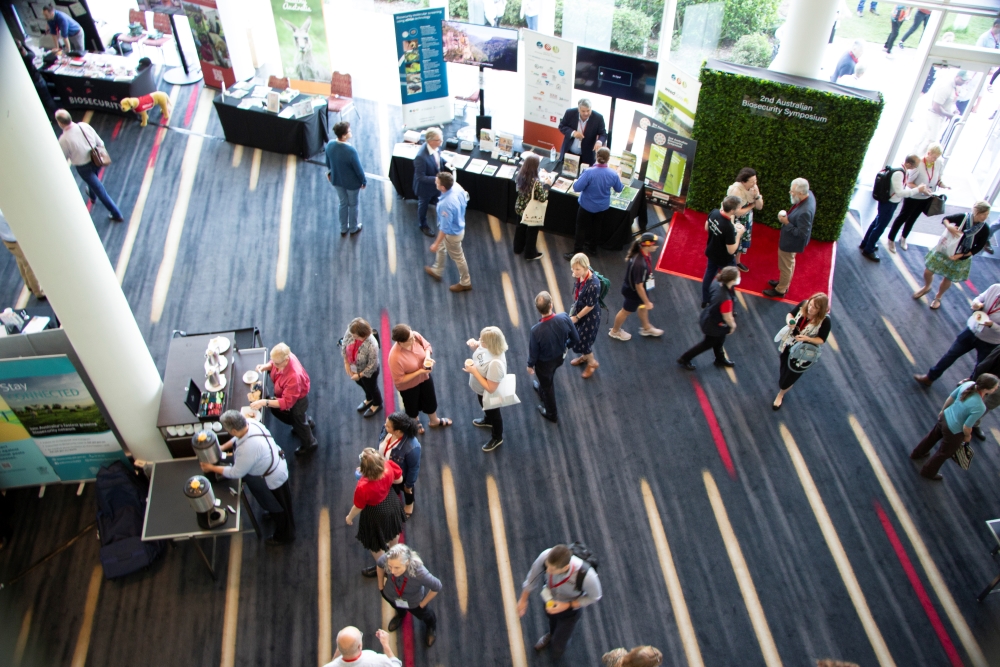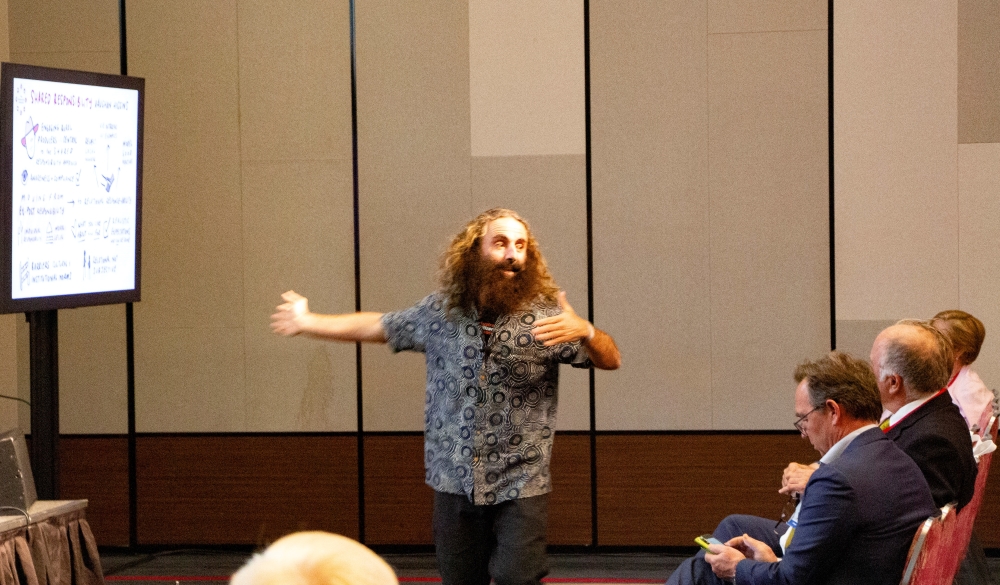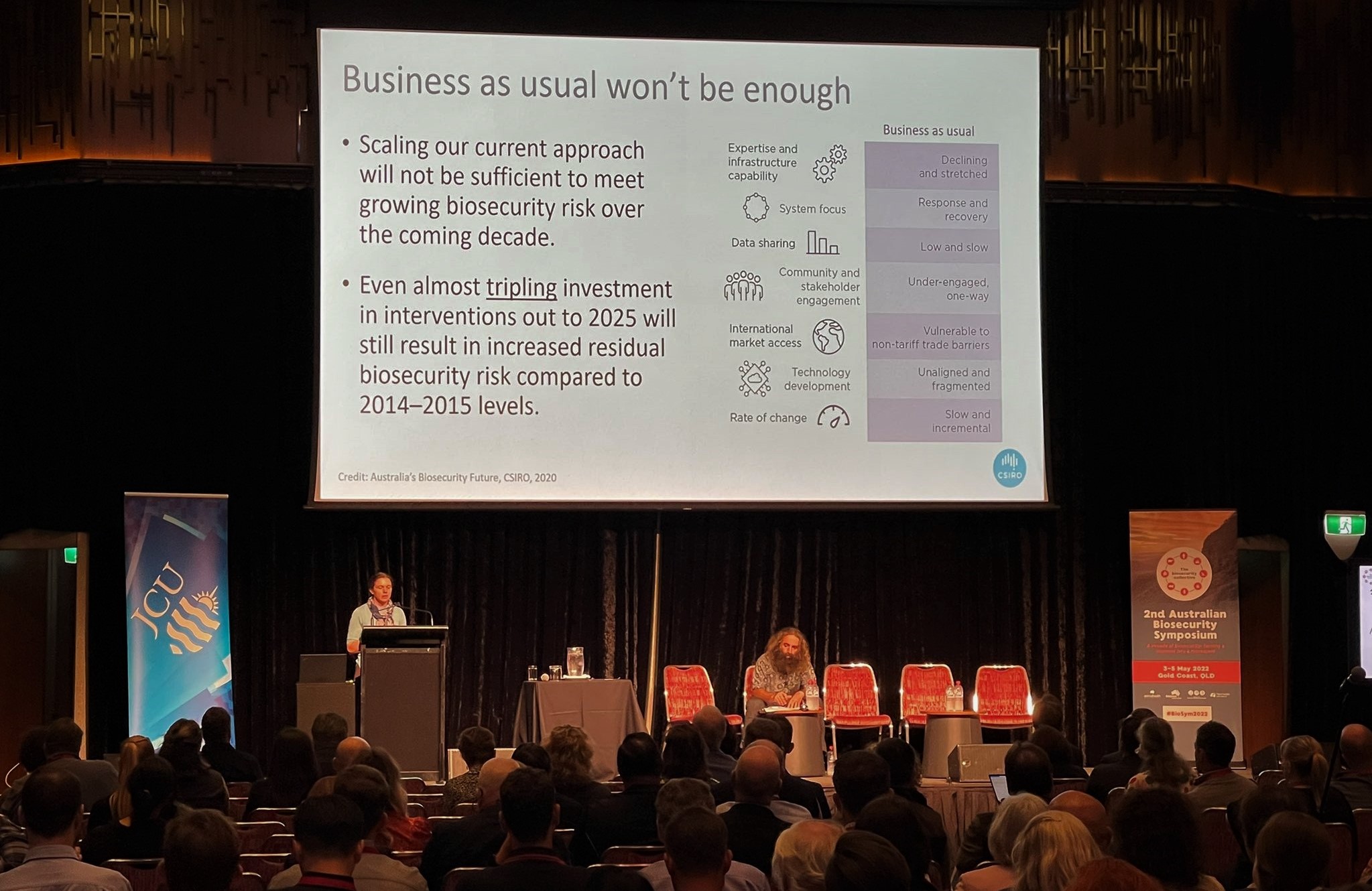Momentum builds for a mass biosecurity movement
Over 400 of the country’s leading innovators and influential biosecurity players converged on the Gold Coast last week to accelerate biosecurity reform.
‘The Biosecurity Collective’ of Animal Health Australia, Invasive Species Council, Centre for Invasive Species Solutions, and Plant Health Australia hosted the 2nd Australian Biosecurity Symposium to define and influence the direction of Australia’s biosecurity system towards 2030, particularly in engaging all Australians to build a stronger biosecurity system and a mass biosecurity movement.
Symposium presentations and panel discussions were positioned around four themes:
- Connecting the dots — enhancing the system and its resilience
- Empowering action — working together for transformational change
- Future-focused — how science and tech are paving the way forward
- Mainstreaming biosecurity — turning buzzwords into a way of life.

Symposium delegates were told that Australia’s biosecurity system faces unprecedented pressure. Credit: Gabriel George.
Day One Highlights
Costa Georgiadis introduces the Symposium
Mr Costa Georgiadis — the dynamic landscape architect, environmental educator and television presenter — began the symposium with a introduction that drew on his all-consuming passion for plants and people, reminded delegates of their role as ‘communication amplifiers’ urging them to use their reach to share biosecurity moments.
“The symposium offers an opportunity to influence the direction of Australia’s biosecurity system.
“We’re focusing on biosecurity preparedness, as it’s not a case of ‘if’ but ‘when’ a new biosecurity threat arrives.”

Costa Georgiadis was a livewire MC at the 2nd Biosecurity Symposium. Credit: Gabriel George.
First keynote address — Dr Anika Molesworth

Dr Anika Molesworth spoke from personal experience on working together for transformational change. Credit: Animal Health Australia.
Dr Anika Molesworth — a farming thought-leader and researcher from far west NSW — took delegates on a climate change journey challenging them to have the courage to choose not only the story they want for our land but also the legacy we want to leave to future generations.
“We have commonality in complex problems. We are here because we are problem solvers. We all believe there is a better way of doing things.
“I walk alongside others who are on a climate change journey, trying to find ways to shift the trajectory so that we have the best future imaginable.”
Second keynote address — Dr Debbie Eagles, Deputy Director, Australian Centre for Disease Preparedness, CSIRO
Dr Debbie Eagles is an epidemiologist with a background in vector-borne diseases and has extensive experience in animal health and biosecurity preparedness and response in Australia.
She highlighted how research and innovation is fundamental in transforming the national biosecurity system and how it needs to be underpinned by digital and genetic surveillance systems supported by citizen science, big data analytics and fully integrated pre-border and post-border systems.
“Speed of detection is imperative to effective, efficient control.
“The biosecurity sector is facing significant threats but through science and technological innovation, and engagement of the broader community, we are capable of transformational change.”

Dr Debbie Eagles said that even with nearly three times the investment in interventions out to 2025 there will still be increased residual biosecurity risk compared to 2014‒15 levels. Credit: Animal Health Australia.
Launch of the Decade of Biosecurity
The final session of the day saw the launch of the Decade of Biosecurity, an initiative designed to mobilise a 25-million strong mass movement in Australia, secure biosecurity investment, foster innovation. and create a formal partnership between government, industry and the community.
The initiative is being advanced by the Invasive Species Council on behalf of the National Farmers’ Federation, Landcare Australia, the National Landcare Network, Animal Health Australia, Plant Health Australia, NRM Regions Australia and the Centre for Invasive Species Solutions.
Mr Andrew Cox, Invasive Species Council CEO said the Decade of Biosecurity was needed to build a better biosecurity system that protected the economy, the environment and Australian’s way of life.

Andrew Cox speaking at the Launch of the Decade of Biosecurity. Credit: Gabriel George.
“We want to ensure that every individual Australian, business and organisation recognises and understands their role and the important contribution they can play in creating a stronger and more resilient biosecurity system.”




